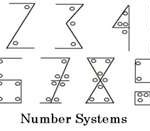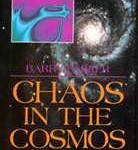 A washing machine cleans clothes by the actions of the soap, water, agitator, spin, and other mechanical features. (The how.) An engineer wishing to invent a better machine or a householder looking for a newer model may profitably study these features. The ultimate reason that the machine cleans clothes, however, is because someone wants clean clothes, loads dirty clothes and soap into the machine, and turns it on. (The why.)
A washing machine cleans clothes by the actions of the soap, water, agitator, spin, and other mechanical features. (The how.) An engineer wishing to invent a better machine or a householder looking for a newer model may profitably study these features. The ultimate reason that the machine cleans clothes, however, is because someone wants clean clothes, loads dirty clothes and soap into the machine, and turns it on. (The why.)
 A computer math course taught me that we can have other number systems than the one based on ten. Computer systems, at least when I was studying them, are based on the binary system, the on/off properties of two. You go on up to four, eight, sixteen, thirty-two, sixty-four, and so on. Presumably you can have a system based on threes or thirteens or three thousand and sevens, if you want to. In other words, the possibilities are endless.
A computer math course taught me that we can have other number systems than the one based on ten. Computer systems, at least when I was studying them, are based on the binary system, the on/off properties of two. You go on up to four, eight, sixteen, thirty-two, sixty-four, and so on. Presumably you can have a system based on threes or thirteens or three thousand and sevens, if you want to. In other words, the possibilities are endless.
 A previous blog discussed systems that we, as yet, have no way to predict. The usual example given is the weather, which we still can’t accurately predict beyond two or three days.(In the Puget Sound region, even the prediction of a few hours can be in error.) The author theorized that these systems we can’t predict aren’t really chaotic, but we lack the knowledge to unlock them. And when we answer one question, we find a thousand more waiting.
A previous blog discussed systems that we, as yet, have no way to predict. The usual example given is the weather, which we still can’t accurately predict beyond two or three days.(In the Puget Sound region, even the prediction of a few hours can be in error.) The author theorized that these systems we can’t predict aren’t really chaotic, but we lack the knowledge to unlock them. And when we answer one question, we find a thousand more waiting.
 The universe amazes us with its complexity. Humankind is equally marvelous. The study of both leaves us in awe and provides useful knowledge, but the ultimate why for these marvelous works is beyond science. That journey begins with faith that sends us in another direction.
The universe amazes us with its complexity. Humankind is equally marvelous. The study of both leaves us in awe and provides useful knowledge, but the ultimate why for these marvelous works is beyond science. That journey begins with faith that sends us in another direction.

